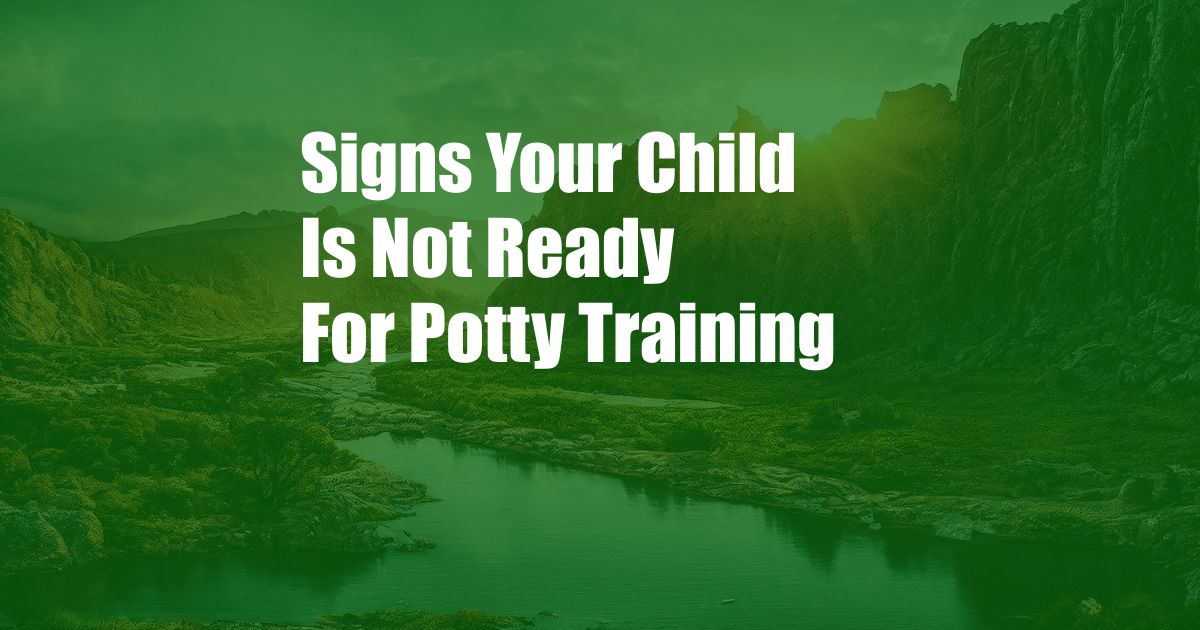
Signs Your Child is Not Ready for Potty Training
Potty training is a significant milestone in a child’s development, but it’s crucial to recognize when your little one may not be ready for this transition. Here are some telltale signs to watch out for:
Ignoring Wet or Soiled Diapers: If your child doesn’t seem bothered by wearing a wet or soiled diaper, it suggests they may not yet associate discomfort with being dirty.
Recognizing Bodily Cues
Lack of Control Over Bowel Movements and Urine: Involuntary bowel movements and urination indicate that your child may not have sufficient muscle control to voluntarily hold waste.
Difficulty Pulling Pants Up and Down: If your child struggles to pull pants or underwear up and down independently, it can hinder their ability to initiate and complete potty training.
Physical and Developmental Readiness
Physiological Maturity: Potty training typically begins when children can physically hold urine and bowel movements for longer periods. This usually happens around 24-30 months.
Cognitive Development: Children need to understand the purpose of a potty, follow simple instructions, and communicate their needs effectively.
Emotional Readiness: Your child should be motivated and cooperative, showing a desire to please and a willingness to learn new skills.
Environmental and Behavioral Factors
Life Changes: Major life events, such as a new sibling, moving, or starting daycare, can disrupt a child’s routine and readiness for potty training.
Resistance or Behavioral Issues: If your child actively resists potty training or exhibits resistance behaviors, such as hiding, refusing to sit on the potty, or reverting to soiled diapers, it may be a sign they’re not yet ready.
Tips and Expert Advice
Wait for Physical and Developmental Milestones: Don’t start potty training before your child is physically and developmentally prepared.
Gradual Introduction: Slowly introduce the concept of potty training by reading books, playing pretend games, or simply exposing your child to the potty.
Stay Patient and Supportive: Potty training takes time and consistency. Avoid punishing or shaming your child for accidents, and offer plenty of praise and encouragement for successes.
Create a Regular Potty Schedule: Establish a regular schedule for your child to sit on the potty, even if they don’t initially go. This helps familiarize them with the routine.
Make the Potty Fun: Use colorful potty chairs, stickers, or songs to make the experience more engaging for your child.
FAQs
Q: What age is the best time to start potty training?
A: Most children are ready to start potty training between 24-30 months.
Q: How long does potty training usually take?
A: The time it takes varies but can range from a few weeks to several months.
Q: What if my child is not ready for potty training?
A: Don’t force it. Wait until your child shows signs of readiness and avoid punishing or shaming them for accidents.
Conclusion
Recognizing the signs that your child is not ready for potty training can save both you and your child from frustration. By considering the physical, developmental, and environmental factors involved, you can create a supportive and positive potty training experience when your child is truly prepared.